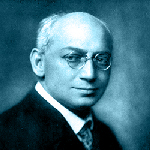Sándor Ferenczi was a Hungarian psychoanalyst, a key theorist in the Budapest School of Psychoanalysis and a close associate of Sigmund Freud.
He was born on 7 July 1873, in the town of Miskolc, Austria-Hungary, and spent his early life working as a psychoanalyst for the most troubled of patients. It was during this time that Ferenczi cemented his conviction that his patients accounts of sexual abuse as children were truthful, having verified these accounts with other members of the family. This was a major cause of his later disputes with Sigmund Freud.
In 1918, Ferenczi was appointed President of the
International Psychoanalytic Association, but only served in this position for a year, preferring practical psychoanalytical work instead. During the early 1920’s, Ferenczi criticised Freud’s ‘classical’ mode of interpretation which made great use of preconceived models, instead opting for a more person-centred therapy. Today, many relational therapists have favoured Ferenczi’s theories, approving of the clinical emphasis on inter-subjectivity, intimacy and perhaps most importantly, being aware of the analyst’s own countertransference. Ferenczi also published
Thalassa: A Theory of Geniality in 1924, suggesting that the wish to return to the womb reflects a more archetypal desire to return to the origin of life; the sea.
Towards the end of his life, Ferenczi suffered from pernicious anaemia, which caused fatigue, fever and depression, eventually resulting in severe neurological complications. Though desperately ill with the (then) un-treatable disease, Ferenczi managed to deliver his most famous paper, the
Confusion of Tongues to the 12
th International Psycho-Analytic Congress in Wiesbaden, Germany on 4 September 1932. This paper argued that the traumatic effects of deprivation or empathetic failure during childhood caused neurotic personality and psychotic disorders during adulthood. According to this argument, trauma develops as a result of sexual abuse by a parent or authority figure, leading to a ‘confusion of tongues’, when the adult subsequently interprets these experiences in a language that the child does not know. Ferenczi died only seven months later, on 22 May, 1933 in Budapest, Hungary.


